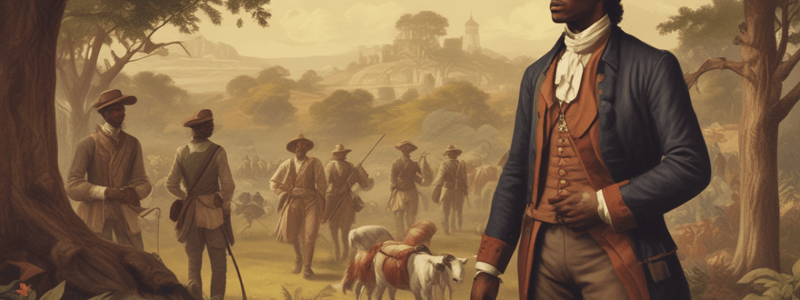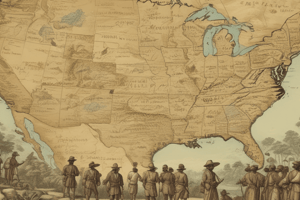Podcast
Questions and Answers
Who co-authored the Fundamental Constitutions of Carolina in 1669?
Who co-authored the Fundamental Constitutions of Carolina in 1669?
- George Washington
- James Oglethorpe
- John Locke (correct)
- Thomas Jefferson
What was the majority of the population in South Carolina by 1750?
What was the majority of the population in South Carolina by 1750?
- Free European population
- Free African population
- Enslaved European population
- Enslaved African population (correct)
What was the original stance on slavery in the Georgia colony?
What was the original stance on slavery in the Georgia colony?
- It was legal from the beginning
- It was only allowed for certain crimes
- It was banned by the trustees (correct)
- It was only allowed for people of a certain age
What was the consequence of killing a rebellious enslaved person in South Carolina by 1740?
What was the consequence of killing a rebellious enslaved person in South Carolina by 1740?
What was the condition for freeing an enslaved laborer in South Carolina?
What was the condition for freeing an enslaved laborer in South Carolina?
What was the background of many early settlers in Carolina?
What was the background of many early settlers in Carolina?
Flashcards are hidden until you start studying
Study Notes
Slavery in South Carolina and Georgia
- Slavery was central to colonial life in South Carolina and Georgia, but local conditions created a distinct system in each colony.
Georgia
- Founded by a philanthropic group, including James Oglethorpe, who initially banned slavery from the colony.
- By 1750, slavery was legal throughout the region.
South Carolina
- Founded as a slave colony, with the majority of the population consisting of enslaved Africans by 1750.
- The Fundamental Constitutions of Carolina (1669), co-authored by John Locke, explicitly legalized slavery from the beginning.
- Early settlers from British Caribbean sugar islands brought brutal slave codes, allowing for the legal punishment of defiant enslaved people through beatings, branding, mutilation, and even castration.
- In 1740, a new law declared that killing a rebellious enslaved person was not a crime, and the murder of an enslaved person was treated as a minor misdemeanor.
- The colony banned the freeing of enslaved laborers unless the freed person left the colony.
Studying That Suits You
Use AI to generate personalized quizzes and flashcards to suit your learning preferences.




